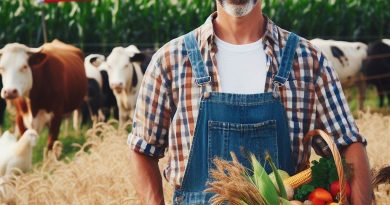Sustainable Farms: Talking with Farmer Lee
Last Updated on February 23, 2024
Introduction
Sustainable farming is an approach that aims to meet present agricultural needs without compromising future generations’ ability to do the same.
It focuses on preserving the environment, promoting biodiversity, and using resources efficiently.
Farmer Lee is a seasoned farmer who is well-versed in sustainable farming methods.
With his extensive knowledge and passion for the environment, he has successfully implemented sustainable practices on his farm.
Using organic fertilizers and natural pest control methods, Farmer Lee avoids the use of harmful chemicals that can harm the environment and consumers.
He believes that healthy soil is the foundation of a sustainable farm, ensuring nutrient-rich crops and resilience to climate change.
Farmer Lee employs crop rotation and cover cropping techniques, which improve soil fertility and reduce erosion.
Water conservation is another crucial aspect of sustainable farming that Farmer Lee prioritizes.
He has implemented irrigation systems that minimize water usage and carefully manages water resources.
By capturing rainwater, he reduces reliance on conventional water sources.
This not only protects the environment but also reduces costs for the farm.
Farmer Lee practices responsible animal husbandry, ensuring the welfare of his livestock.
He maintains proper housing conditions, provides them with a balanced diet, and allows them access to pasture.
His approach minimizes the environmental impact of animal farming while ensuring the production of ethically raised, high-quality meat.
In essence, sustainable farming is a holistic approach that prioritizes environmental conservation, efficient resource utilization, and ethical practices.
Farmer Lee exemplifies these principles on his farm, making him an expert in sustainable farming.
By adopting sustainable methods, we can create a more resilient and healthier agricultural system for future generations.
Background on Farmer Lee’s sustainable farm
Description of Farmer Lee’s farm
Nestled in the heart of a small rural community, Farmer Lee’s farm stretches across 100 acres of pristine land rich in fertile soil.
His sustainable farming practices
Farmer Lee is not your average farmer – he is a pioneer in sustainable farming practices, an embodiment of ecological stewardship.
With an unwavering commitment to preserving the environment and promoting long-term ecological balance, Farmer Lee has implemented a wide array of innovative techniques on his farm.
Utilizing regenerative agriculture methods, Farmer Lee focuses on restoring soil health, reducing chemical inputs, and prioritizing biodiversity.
Farming is not just a means of income for Farmer Lee, but a way of life.
He reveres the land, and his respect for nature is reflected in every aspect of his farming operation.
Instead of relying on harmful chemical pesticides and synthetic fertilizers, Farmer Lee opts for natural alternatives, such as crop rotation, cover cropping, and Integrated Pest Management (IPM) techniques.
By integrating livestock into his farming system, Farmer Lee creates a closed-loop ecosystem where animal waste feeds the soil, reducing the need for external inputs and enhancing nutrient cycling.
Farmer Lee believes that sustainable farming is not only beneficial for the environment but also produces healthier and more nutritious crops.
His dedication to sustainable farming has garnered recognition and support from the local community, as well as consumers who seek out his organic produce at farmers’ markets.
Farmer Lee’s farm serves as an educational platform for aspiring farmers and visitors, offering workshops and tours to share knowledge about sustainable farming practices.
Through these initiatives, Farmer Lee hopes to inspire others to embrace a more sustainable approach to agriculture and contribute to building a
resilient and healthy food system for future generations.
Read: Urban Farms: A Chat with City Grower Mike
Importance of sustainable farming
Explanation of why sustainable farming is crucial for the environment
- Sustainable farming helps protect the soil from erosion, preserving its fertility.
- By using organic methods, sustainable farms avoid the use of harmful pesticides and chemicals.
- Water conservation is a key focus of sustainable farming, reducing water pollution and wastage.
- Implementing crop rotation and cover cropping techniques helps control pests and diseases naturally.
- Sustainable farms promote biodiversity, preserving habitats and promoting the health of ecosystems.
Benefits of sustainable farming for local communities:
- Sustainable farms provide fresh, healthy, and nutritious food options for local communities.
- They reduce reliance on industrial agriculture, supporting small-scale farmers and fostering food security.
- Local economies benefit as sustainable farming creates jobs and generates revenue within the community.
- By practicing sustainable methods, farmers can improve the long-term viability of their businesses.
- Community-supported agriculture (CSA) programs allow consumers to directly support sustainable farms.
Sustainable farming is a crucial practice that benefits both the environment and local communities.
By implementing sustainable methods, farmers can contribute to the preservation of our planet and create a more resilient and sustainable food system.
Read: From Seed to Table: A Day with Paul
Farmer Lee’s journey to sustainable farming
Personal motivation for adopting sustainable practices
- Farmer Lee’s decision to embrace sustainable farming stems from his deep respect for nature.
- He believes in the importance of preserving the environment and leaving a better world for future generations.
- Witnessing the harmful effects of conventional farming methods on the ecosystem pushed him to make a change.
- Farmer Lee acknowledges that sustainable practices are not only beneficial for the planet but also lead to healthier produce.
- He strongly believes in the principle of working with nature, rather than against it, and minimizing the use of synthetic chemicals.
Challenges faced during the transition to sustainable farming
- One of the major challenges that Farmer Lee encountered was the resistance from traditional farmers in his community.
- Many were skeptical about the effectiveness and profitability of sustainable farming methods.
- Farmer Lee had to invest extra time and effort in educating people about the benefits of sustainable practices.
- The initial setup cost for implementing sustainable farming techniques was also a significant challenge for Farmer Lee.
- Building a network of reliable suppliers for organic inputs and resources proved to be a time-consuming task.
- Weather variability and adapting to new farming techniques posed additional challenges.
- Farmer Lee had to invest time in learning and experimenting with organic pest control and soil management practices.
- Managing pests and maintaining soil fertility required more hands-on monitoring and intensive labor compared to conventional farming.
- Despite all the challenges faced, Farmer Lee believes that the rewards of sustainable farming outweigh the difficulties.
- The increased demand for organic produce and the positive feedback from consumers have motivated him to persist.
In fact, Farmer Lee’s journey to sustainable farming was driven by his personal motivation to preserve the environment and produce healthier crops.
He faced challenges such as resistance from traditional farmers, high setup costs, and the need for education and experimentation.
However, the rewards of sustainable farming, such as increased demand and positive consumer feedback, have encouraged him to continue on this path.
Farmer Lee serves as a source of inspiration for others interested in adopting sustainable practices and demonstrates the potential for a more sustainable future in agriculture.
Read: The Organic Pioneer: Linda’s Legacy

Sustainable farm practices implemented by Farmer Lee
Organic farming methods
Sustainable farming practices are at the core of Farmer Lee’s agricultural operations.
He has embraced organic farming methods, which prioritize the use of natural fertilizers and avoid synthetic chemicals.
By doing so, he effectively minimizes the potential negative impacts on the environment, such as soil erosion and water pollution.
Crop rotation techniques
One of the key strategies implemented by Farmer Lee is crop rotation. He understands the importance of alternating crops to deter pests and diseases.
By changing crops, Farmer Lee disrupts the life cycles of potential threats, reducing the need for chemical pesticides.
Additionally, crop rotation supports soil fertility and helps combat soil erosion, leading to healthier and more sustainable farming practices.
Integrated pest management
Integrated pest management is another approach Farmer Lee employs on his farm.
Instead of relying solely on conventional pesticides, he embraces a holistic and diversified strategy.
Farmer Lee encourages the presence of beneficial insects, which act as natural pest control agents.
Monitoring pest populations allows him to intervene when necessary, with minimal use of chemical pesticides.
By integrating different pest control methods, Farmer Lee maintains a harmonious balance between his crops and the environment.
Utilization of renewable energy sources
To further enhance his farm’s sustainability, Farmer Lee harnesses renewable energy sources.
Solar panels have been installed on his property, providing the necessary electricity for lighting, irrigation systems, and farm equipment.
This move not only reduces the farm’s dependence on fossil fuels but also lowers its carbon footprint by minimizing greenhouse gas emissions.
By using clean and renewable energy, Farmer Lee exemplifies the role of sustainable practices in agricultural operations.
In short, Farmer Lee has implemented various sustainable farm practices to foster a healthier and more environmentally friendly farming system.
By embracing organic farming methods, practicing crop rotation, adopting integrated pest management, and utilizing renewable energy, he leads by example and demonstrates the viability of sustainable agriculture.
Farmer Lee’s commitment to sustainability serves as an inspiration to other farmers seeking to adopt similar practices for a better future.
Read: Family Farm Life: The Smiths’ Tale
Results and impact of sustainable farming on Farmer Lee’s farm
A shift towards sustainable farming practices has brought about numerous positive outcomes for Farmer Lee and his farm.
This section will explore some of the most significant results and impacts that have been observed.
Increased crop yields
- The adoption of sustainable farming techniques has led to a noticeable increase in crop yields.
- Farmer Lee’s farm has seen a substantial growth in output, resulting in higher profits and improved livelihood.
- The implementation of organic fertilizers and crop rotation methods has contributed to healthier plants and increased productivity.
- By prioritizing soil health and adopting natural pest control methods, Farmer Lee has been able to optimize his crop production.
Improved soil health and fertility
- Sustainable farming practices have brought significant improvements in the overall health and fertility of Farmer Lee’s soil.
- By avoiding the use of synthetic chemicals and relying on organic fertilizers, the soil has become richer in nutrients.
- The adoption of cover cropping and reduced tillage techniques has helped in retaining moisture and preventing erosion.
- Improved soil health has resulted in better water infiltration, reduced runoff, and overall enhanced ecosystem resilience.
Reduction in chemical usage
- Sustainable farming methods have allowed Farmer Lee to minimize the use of harmful chemicals on his farm.
- By adopting integrated pest management strategies, he has been able to control pests naturally without relying heavily on pesticides.
- The use of organic fertilizers and composting techniques has reduced the dependence on synthetic fertilizers.
- Farmer Lee’s commitment to sustainable practices has significantly lowered the environmental impact associated with chemical usage.
Positive impact on local wildlife
- The shift towards sustainable farming has created a welcoming environment for local wildlife on Farmer Lee’s farm.
- By eliminating chemical pesticides, beneficial insects and pollinators have made a comeback, contributing to a more balanced ecosystem.
- Through the preservation of natural habitats and the creation of wildlife corridors, biodiversity has thrived on the farm.
- The conservation and protection of local wildlife species have brought joy and a sense of fulfillment to Farmer Lee.
In essence, sustainable farming practices have had a transformative impact on Farmer Lee’s farm.
The adoption of these practices has resulted in increased crop yields, improved soil health and fertility, reduced chemical usage, and enhanced local wildlife populations.
Farmer Lee’s commitment to sustainability not only benefits his farm’s productivity and profitability but also contributes to the conservation of the environment and the promotion of a healthier ecosystem.
The results and impacts demonstrated by Farmer Lee serve as an inspiration for other farmers to embrace sustainable farming practices for the betterment of their farms and the planet as a whole.
Farmer Lee’s commitment to education and community outreach
Workshops and seminars hosted by Farmer Lee
Farmer Lee actively organizes and hosts various workshops and seminars to educate the community about sustainable farming practices.
These workshops cover a range of topics, such as organic farming techniques, crop rotation methods, and the importance of soil health.
Participants get a hands-on experience by participating in farm activities and learning about the real challenges faced by sustainable farmers.
Farmer Lee’s workshops also provide a platform for like-minded individuals to network, share ideas, and collaborate on future initiatives.
Collaboration with local schools and colleges
Recognizing the importance of youth involvement, Farmer Lee collaborates with local schools and colleges to promote sustainable farming.
He regularly invites students to visit his farm, offering them an opportunity to connect with nature and gain practical knowledge.
Through these visits, students learn about the importance of sustainable agriculture, the environmental impact of conventional farming, and the benefits of local food production.
In collaboration with schools, Farmer Lee also develops curriculum materials focused on sustainable farming practices, which are integrated into the existing educational programs.
Additionally, Farmer Lee frequently visits colleges and universities as a guest speaker, sharing his experiences and inspiring students to pursue careers in sustainable agriculture.
Advocacy for sustainable farming practices in the wider community
Beyond his farm and educational initiatives, Farmer Lee actively advocates for sustainable farming practices in the wider community.
He participates in local and regional events to raise awareness about the benefits of sustainable agriculture and the need for change in conventional farming methods.
Farmer Lee has also taken part in local government hearings, where he voices his concerns and proposals for supporting sustainable farming policies.
Through his participation in farmers markets and community events, Farmer Lee interacts with consumers, explaining the importance of buying locally and supporting sustainable farmers.
Furthermore, Farmer Lee collaborates with other farmers in the region to establish farmer co-ops, which help strengthen sustainable farming practices collectively.
In review, Farmer Lee’s commitment to education and community outreach is exemplified through his hosting of workshops and seminars, collaboration with local schools and colleges, and advocacy for sustainable farming practices in the wider community.
By actively engaging with the community and sharing his knowledge and experiences, Farmer Lee is playing a crucial role in inspiring and empowering individuals to embrace and support sustainable farming.
Conclusion
Recap of Farmer Lee’s journey
Farmer Lee’s journey exemplifies sustainable farming. He prioritizes soil health, biodiversity, and community. His practices include crop rotation, cover crops, and composting.
By embracing sustainable methods, he enhances soil fertility.
He reduces reliance on chemicals and promotes natural balance. Farmer Lee’s farm is a model of resilience and productivity.
His dedication to sustainability ensures a brighter future.
Call to action
Support sustainable farms in your area. Choose locally grown, organic produce. Join community-supported agriculture (CSA) programs.
Visit farmers’ markets and buy from sustainable vendors. Advocate for policies that promote sustainable agriculture.
Engage with farmers to learn about their practices. Together, we can nurture the earth and feed the future.


